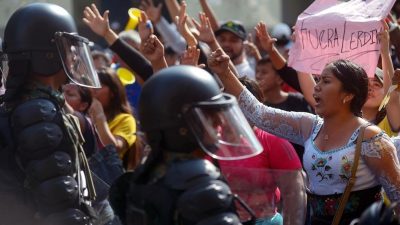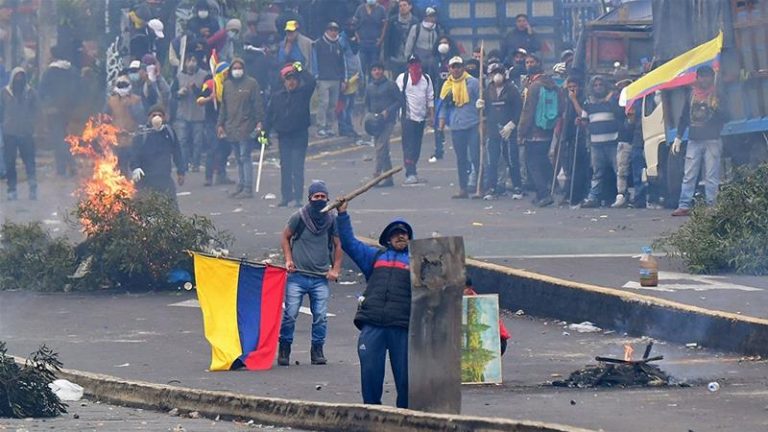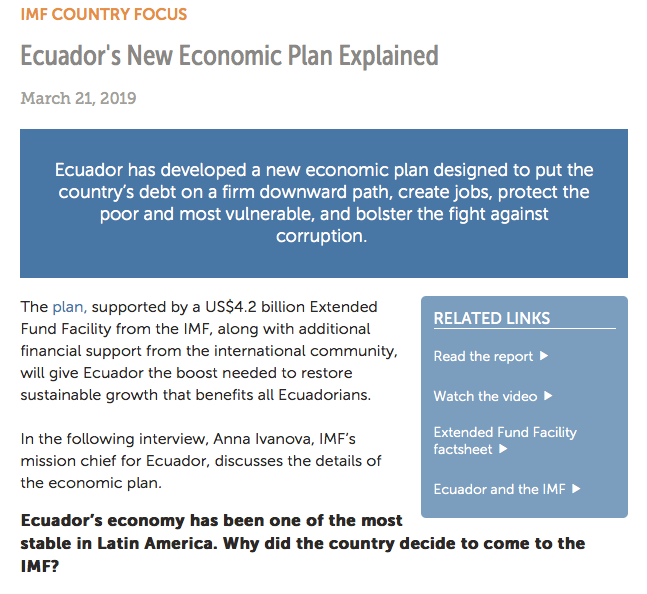Ecuador under President Neo-coño Moreno: The IMF’s Deadly “Economic Medicine”, the Weaponization of Neoliberal Reforms
LATIN AMERICA AND THE CARIBBEAN, 14 Oct 2019
Prof. Michel Chossudovsky – Global Research
Lenin Moreno: aka Neocon Moreno
12 Oct 2019 – A popular insurrection is unfolding against the adoption of sweeping IMF reforms imposed by the “centre left” government of President Lenin Moreno.
In March 2019, a 4.2 billion dollar IMF loan was granted to Ecuador.
“We are here to help you” says the IMF. Our objective is to help Ecuador “modernize its economy and pave the way for strong, sustained, and equitable growth.”
Nonsense!
This loan agreement initiates a process of economic and social destruction. What is at stake is an engineered economic depression.
The Neocons in Washington are firmly behind the IMF’s deadly economic medicine.
Meanwhile, president Lenin Moreno, an alleged socialist and “Leninist” inspired by Russian Revolutionary Vladimir Lenin has fully endorsed the neoconservative agenda.
While President Lenin Moreno leads the centre-left Movimiento Alianza PAIS (Patria Altiva I Soberana), he is a “Neocon” in disguise, a US proxy: nicknamed President NeoCon Moreno. in Spanish Señor presidente Neo-coño Moreno.
Mike Pompeo and Moreno are buddies.
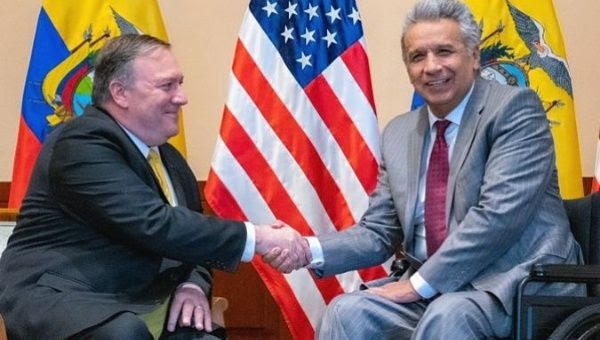
In Quito, July 2019, Secretary of State Pompeo welcomed “new” relations with Ecuador. ” A new era has begun”, not to mention the arrest of Julian Assange by British authorities in April.
The IMF’s Deadly Economic Medicine
It’s the standard IMF economic medicine, the so-called “economic package” (paquetazo) imposed on indebted countries. It sets the stage for a major dislocation of Ecuador’s national economy.
Quite deliberately, the policies of the IMF are intended to impoverish an entire country, take over Ecuador’s oil economy. The IMF acts on behalf of Wall Street and the “Washington Consensus”.
While the IMF policy conditionalities are couched in technical jargon, the objectives are crystal clear (emphasis added):
The authorities’ measures are geared towards strengthening the fiscal position and improving competitiveness and by so doing help lessen vulnerabilities, put dollarization on a stronger footing, and, over time, encourage growth and job creation.[Nonsensical statement]
“Achieving a robust fiscal position is at the core of the authorities’ program, which will be supported by a three-year extended arrangement from the IMF. The aim is to reduce debt-to- GDP ratio through a combination of a wage bill realignment, a careful and gradual optimization of fuel subsidies,”
What is the meaning of
“A combination of a wage bill realignment, a careful and gradual optimization of fuel subsidies”?
Answer:
Massive layoffs in the public sector, dramatic hikes in fuel prices, reduction in real wages, the privatization of pension funds, the privatization of health and education.
The price of diesel more than doubled overnight leading to the paralysis of public transportation. Gasoline prices increased by 29%.
The media will say that gasoline was subsidized. This is a misleading statement. Ecuador is the largest oil economy in South America after Venezuela. It has ample surpluses of crude oil. It sells oil locally at a price which is lower than the export price also with a view to supporting local industries. This is a standard practice in many oil producing economies.
These dramatic hikes in fuel prices contribute to destabilizing all major sectors of the national economy. They immediately trigger inflation and a collapse in purchasing power, the contribute to the paralysis of public transport as well as internal commodity trade.
Fake IMF Loan
The dollar denominated external debt of Ecuador has skyrocketed.
The $4.2 billion loan does not contribute to an increase in financial resources for Ecuador. Quite the opposite. The IMF loan is tagged for the reimbursement of Ecuador’s external debt obligations. It comes in and it goes out. New loans to pay back old debts. It is fake loan. What it does is to “subsidise” Ecuador’s external creditors.
We cannot pay our debt servicing obligations. No problem says the IMF: we will lend you the money and with that money you will pay us back, namely the IMF loan is a “safety net” for Ecuador’s external creditors, namely Wall Street.
Ecuador no longer has control over its fiscal and monetary policy.
It’s central bank has been transformed into a colonial style currency board.
The entire financial system is dollarised, namely the US Federal Reserve and Wall Street ultimately call the shots.
In a dollarised economy, internal debts become external debts expressed in US dollars.
An entire nation has been impoverished.
The external debt goes fly hight. Macro-economic policies are controlled by the creditors.
**************
(Click to Read) The IMF Report
Context: The authorities face a difficult situation. Wage increases have outpaced productivity growth [IMF calls for a reduction in real wages] over the past decade which, has led to a deterioration in competitiveness. This has been exacerbated by a strong U.S. dollar—Ecuador’s economy is fully dollarized—leaving the real exchange rate overvalued. [engineered by Wall Street]
Public debt is high and rising, the government faces sizable gross financing needs, and international reserves are precariously low. The recent volatility in oil prices and tighter global financial conditions have exacerbated these strains.
Article IV: The Article IV discussions focused on diagnosing the nature of the imbalances facing Ecuador and the policy changes that will be needed to address them. At the center of the discussion was the proper calibration of the size, pace, and composition of the reduction in the fiscal deficit that will be needed in the coming years. [implementation of drastic austerity measures] In addition, there was broad agreement that fundamental supply-side efforts will be needed to foster competitiveness, create jobs, rebuild institutions, and make Ecuador a more attractive destination for private investment. Finally, improving the social safety net and increasing the effectiveness of public spending, particularly on health and education, will be essential to achieving strong, sustained, and socially equitable growth.
Program Objectives: Consistent with the findings of the Article IV, the authorities’ policy plan seeks to decisively address the systemic vulnerabilities facing Ecuador. The goals of these policies are to boost competitiveness and job creation, protect the poor and most vulnerable, fortify the institutional foundations for dollarization, [denies Ecuador to have an independent and sovereign monetary policy] and to improve transparency and good governance to public sector operations while strengthening the fight against corruption.
Program Modalities: The proposed program would be a 36-month Extended Fund Facility with access of US$4.209 billion (SDR 3.035 billion, 435 percent of quota) [New loans to pay back outstanding foreign debts, harsh policy conditionalities imposed by creditors].
The program has quarterly reviews and the full amount of Fund resources would be made available for direct budget support. Performance criteria have been established on the non-oil primary balance of the nonfinancial public sector (including fuel subsidies), net international reserves (excluding bank deposits held at the central bank), and on social assistance spending. There are continuous performance criteria to prevent new external payment arrears and to prohibit central bank financing of the nonfinancial public sector (both directly or indirectly through public banks). The program also includes a quarterly indicative target on the overall balance of the nonfinancial public sector.
_______________________________________________
Read more: IMF Hands $4.2 Billion in Loans for Ecuador for Julian Assange
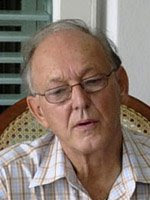 Michel Chossudovsky is an award-winning author, Professor of Economics (emeritus) at the University of Ottawa, Founder and Director of the Centre for Research on Globalization (CRG), Montreal, Editor of Global Research. He has taught as visiting professor in Western Europe, Southeast Asia, the Pacific and Latin America. He has served as economic adviser to governments of developing countries and has acted as a consultant for several international organizations. He is the author of eleven books including The Globalization of Poverty and The New World Order (2003), America’s “War on Terrorism” (2005), The Global Economic Crisis, The Great Depression of the Twenty-first Century (2009) (Editor), Towards a World War III Scenario: The Dangers of Nuclear War (2011), The Globalization of War, America’s Long War against Humanity (2015). He is a contributor to the Encyclopaedia Britannica. His writings have been published in more than twenty languages. In 2014, he was awarded the Gold Medal for Merit of the Republic of Serbia for his writings on NATO’s war of aggression against Yugoslavia. He can be reached at crgeditor@yahoo.com
Michel Chossudovsky is an award-winning author, Professor of Economics (emeritus) at the University of Ottawa, Founder and Director of the Centre for Research on Globalization (CRG), Montreal, Editor of Global Research. He has taught as visiting professor in Western Europe, Southeast Asia, the Pacific and Latin America. He has served as economic adviser to governments of developing countries and has acted as a consultant for several international organizations. He is the author of eleven books including The Globalization of Poverty and The New World Order (2003), America’s “War on Terrorism” (2005), The Global Economic Crisis, The Great Depression of the Twenty-first Century (2009) (Editor), Towards a World War III Scenario: The Dangers of Nuclear War (2011), The Globalization of War, America’s Long War against Humanity (2015). He is a contributor to the Encyclopaedia Britannica. His writings have been published in more than twenty languages. In 2014, he was awarded the Gold Medal for Merit of the Republic of Serbia for his writings on NATO’s war of aggression against Yugoslavia. He can be reached at crgeditor@yahoo.com
Copyright © Prof Michel Chossudovsky, Global Research, 2019
Go to Original – globalresearch.ca
Tags: Conflict, Democracy, Economics, Ecuador, Geopolitics, Human Rights, Latin America Caribbean, Lenin Moreno, Neoliberalism, Politics, Power, Rafael Correa, Social justice, Socialism, USA, Violence
DISCLAIMER: The statements, views and opinions expressed in pieces republished here are solely those of the authors and do not necessarily represent those of TMS. In accordance with title 17 U.S.C. section 107, this material is distributed without profit to those who have expressed a prior interest in receiving the included information for research and educational purposes. TMS has no affiliation whatsoever with the originator of this article nor is TMS endorsed or sponsored by the originator. “GO TO ORIGINAL” links are provided as a convenience to our readers and allow for verification of authenticity. However, as originating pages are often updated by their originating host sites, the versions posted may not match the versions our readers view when clicking the “GO TO ORIGINAL” links. This site contains copyrighted material the use of which has not always been specifically authorized by the copyright owner. We are making such material available in our efforts to advance understanding of environmental, political, human rights, economic, democracy, scientific, and social justice issues, etc. We believe this constitutes a ‘fair use’ of any such copyrighted material as provided for in section 107 of the US Copyright Law. In accordance with Title 17 U.S.C. Section 107, the material on this site is distributed without profit to those who have expressed a prior interest in receiving the included information for research and educational purposes. For more information go to: http://www.law.cornell.edu/uscode/17/107.shtml. If you wish to use copyrighted material from this site for purposes of your own that go beyond ‘fair use’, you must obtain permission from the copyright owner.
Read more
Click here to go to the current weekly digest or pick another article:
LATIN AMERICA AND THE CARIBBEAN:
